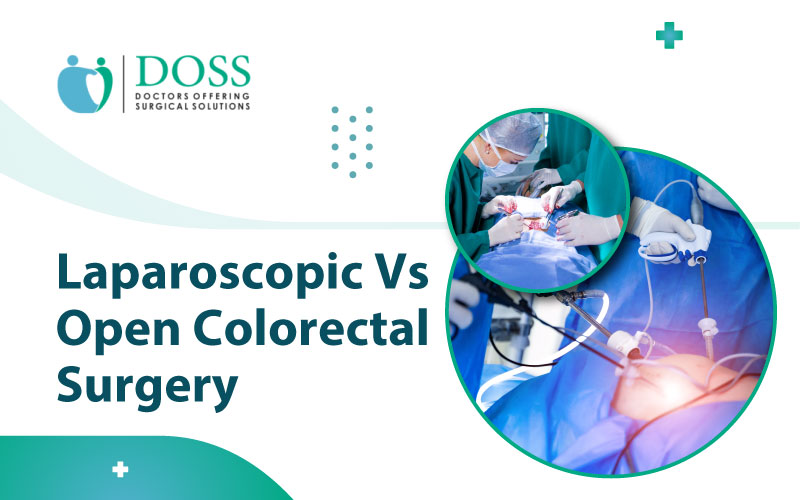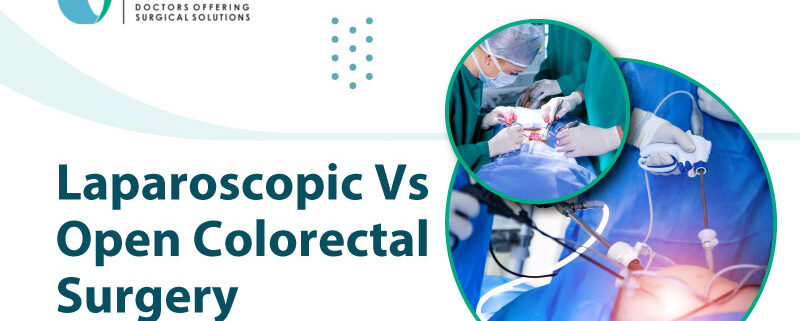Laparoscopic vs Open Colorectal Surgery
Blog
Are you or a loved one facing the prospect of colorectal surgery? The decision to undergo surgery is never easy, but understanding the different surgical approaches can empower you to make an informed choice.
This article will explore the differences between laparoscopic and open colorectal surgery, helping you choose the right approach for your specific needs.
Colorectal Surgery
Colorectal surgery is vital in treating various conditions affecting the colon and rectum. This specialised surgical field offers hope for patients seeking relief from colorectal cancer to diverticulitis and inflammatory bowel disease.
Colorectal surgery aims to restore normal functioning and improve quality of life by removing diseased portions or tumours.
Colorectal cancer, one of the most common cancers worldwide, begins in the colon or rectum and may spread to other body parts. Early detection through regular screenings is crucial in increasing treatment success rates.
Open Colorectal Surgery
Open colorectal surgery is the traditional approach, wherein a large incision is made to access the affected area. This method has been practised for decades and is still commonly used in certain situations.
During open surgery, the surgeon gains direct access to the target site, facilitating precise manipulation and removal of diseased tissue. However, it has drawbacks, including a more extended recovery period and noticeable scarring.
Open surgery may be necessary in some cases when the patient has extensive disease involvement, previous abdominal surgeries, or complex anatomical conditions. It gives the surgeon a clear view and better access to the affected area, ensuring comprehensive treatment.
Regain your strength and power!
Choose our clinic for successful Laparoscopic GI Surgery in Pune. Doss India Clinics has the best laparoscopic surgeon in Pune.
Visit NowLaparoscopic Colorectal Surgery
Laparoscopic colorectal surgery, on the other hand, is a minimally invasive technique that utilises small incisions and specialised instruments. The surgeon inserts a thin tube with a camera (laparoscope) and manipulates surgical instruments through additional small incisions.
This approach offers several advantages, including reduced pain, faster recovery, shorter hospital stays, and minimal scarring. Laparoscopic surgery has revolutionised the field of colorectal surgery, providing patients with a less invasive alternative.
During laparoscopic surgery, the surgeon uses advanced technology to visualise and operate internally using the laparoscope. The camera provides high-definition images of the affected area, allowing for precise and meticulous procedures. The smaller incisions also result in less tissue trauma and blood loss, leading to a quicker recovery and reduced postoperative pain.
A Comparative Analysis
When comparing laparoscopic and open colorectal surgery, several factors come into play. Regarding surgical outcomes, studies have shown comparable success rates between the two techniques.
However, laparoscopic surgery has been associated with lower complication rates, reduced blood loss, and a shorter hospital stay. Additionally, laparoscopic surgery patients often experience less postoperative pain and can resume their daily activities sooner.
The benefits of laparoscopic surgery extend beyond the physical aspects. Patients who undergo this minimally invasive procedure often report improved cosmetic outcomes and psychological well-being due to the smaller incisions and minimal scarring.
Indications and Patient Selection
Determining the appropriate surgical approach depends on various factors, including the patient’s overall health, the complexity of the condition, and the surgeon’s expertise. Laparoscopic surgery is typically suitable for most patients and conditions.
However, certain situations, such as emergency surgeries, extensive disease involvement, or anatomical challenges, may require open surgery. Consulting with a qualified colorectal surgeon in Pune is crucial in determining the best approach for your case.
Your surgeon will evaluate factors such as your age, medical history, body mass index, and the stage of your condition to determine the most suitable surgical approach. They will consider any potential risks and complications associated with each technique, ensuring the best possible outcome for you.
Must Watch this Video
Recovery and Postoperative Care
Recovery after colorectal surgery is a significant consideration for patients. In general, laparoscopic surgery offers a faster recovery compared to open surgery. Patients who undergo laparoscopic surgery often experience less pain, require fewer pain medications, and can resume their regular activities sooner.
However, both approaches require careful postoperative care, including adherence to dietary guidelines, pain management, and follow-up appointments. Your laparoscopic surgeon in Pune will provide detailed instructions to aid your recovery journey.
It’s important to note that every patient’s recovery process is unique, and individual factors such as overall health, age, and the extent of the surgery can influence the timeline. Following your surgeon’s guidance and attending regular follow-up appointments will ensure a smooth recovery and optimal outcomes.
Choosing the right surgical approach for colorectal surgery is a decision that should be made with careful consideration and weighing the pros and cons. Both laparoscopic and open colorectal surgery have advantages and disadvantages, and it’s crucial to consult a qualified surgeon to determine the best approach for your situation.
Laparoscopic surgery offers numerous benefits, including reduced pain, faster recovery, shorter hospital stays, minimal scarring, and improved cosmetic outcomes. This minimally invasive technique utilises small incisions and specialised instruments, allowing for precise and meticulous procedures. Patients who undergo laparoscopic surgery often experience less postoperative pain and can resume their daily activities sooner.
On the other hand, open surgery is the traditional approach that involves a larger incision to access the affected area. This method gives the surgeon direct access and a clear view of the target site. It suits cases involving extensive disease involvement, previous abdominal surgeries, or complex anatomical conditions. However, open surgery has drawbacks, such as a more extended recovery period and noticeable scarring.
Also, Read- Recovery Tips for Laparoscopic Surgery
Conclusion
When considering the surgical approach, factors such as the patient’s overall health, the complexity of the condition, and the surgeon’s expertise must be considered. Laparoscopic surgery is generally suitable for most patients and conditions. Still, emergency surgeries, extensive disease involvement, or anatomical challenges may require open surgery.
Regardless of the chosen approach, careful postoperative care and adherence to the surgeon’s instructions are essential for a smooth recovery. Recovery times may vary depending on individual factors, but both laparoscopic and open surgery require proper pain management, dietary guidelines, and regular follow-up appointments.
choosing between laparoscopic and open colorectal surgery is a decision that should be made in collaboration with your surgeon. Understanding the advantages and disadvantages of each approach can help you make an informed choice based on your specific needs and circumstances. Remember to consult a qualified laparoscopic doctor in Pune who can provide personalised recommendations for the best surgical outcome.


 +919011100010
+919011100010 


